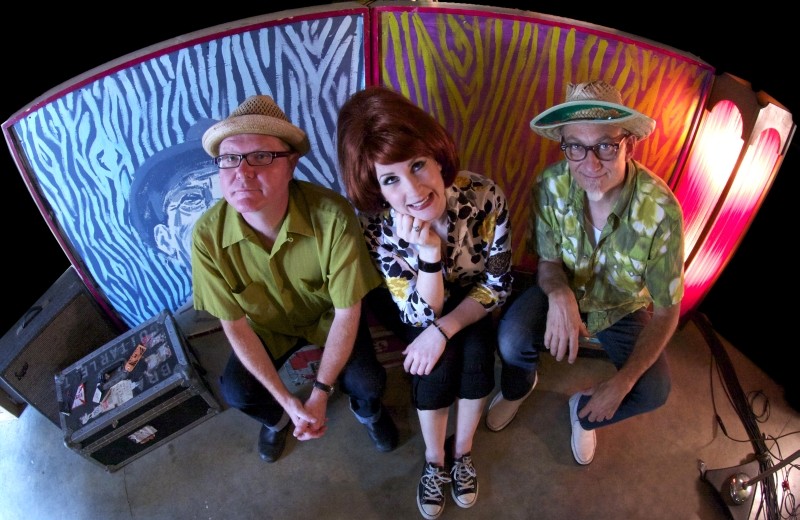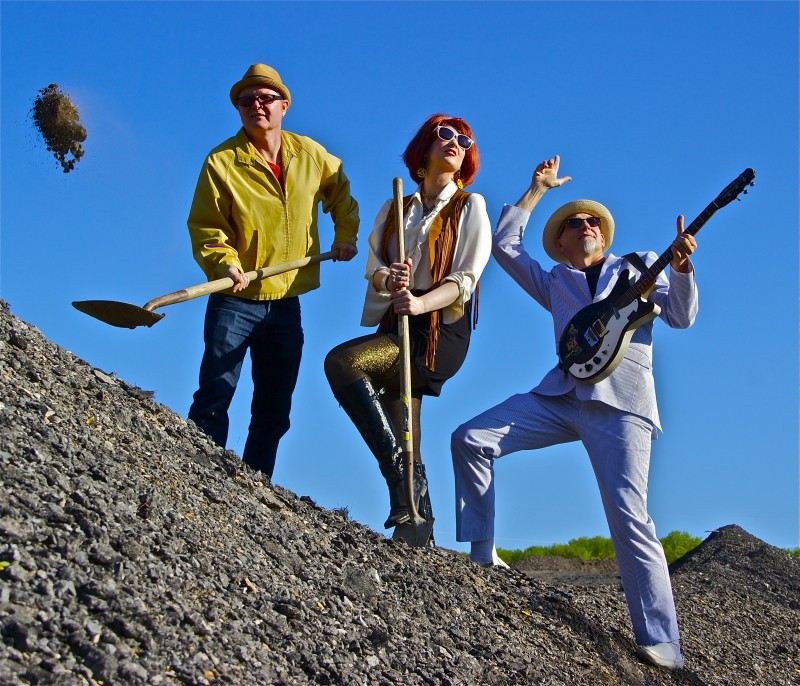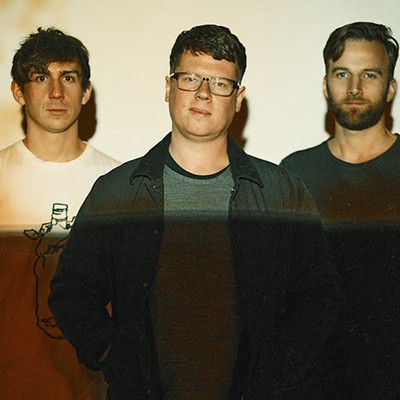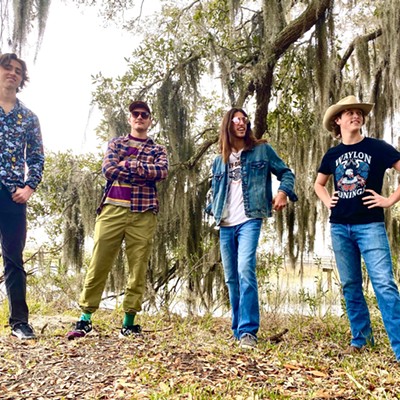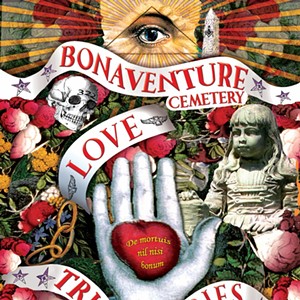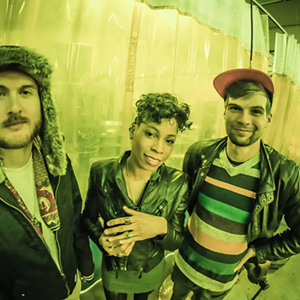FOR 30 years, Southern Culture on the Skids has been cranking out rip-roaring odes to fried chicken, doublewides, and good lovin' in sleazy motels. With an early vow to be as DIY as possible, founder Rick Miller has kept the good-timin', psych-surf-rockabilly beast that is SCOTS alive and thriving through lineup changes, the collapse of the record industry, and the birth of the Internet.
This month, they released Party at my Trouse, a 12” collaboration with pal Fred Schneider of the B-52s—the results are just as zany and perfect as such a team-up sounds on paper.
SCOTS kick off the fifth annual Savannah Stopover Music Festival alongside Turbo Fruits and The Wave Slaves. Come hungry, because local food trucks (yep, you read that right) will be slinging homestyle treats; pair that plate with a refreshing beverage from Lagunitas Brewing Company.
We talked with Miller about SCOTS’ long-overdue Savannah return (it’s been over ten years!), staying independent in an ever-changing industry, and how he keeps Skiddin’ after all this time.
I’m loving the collaboration with Fred Schneider; it’s just so much fun.
Rick Miller: Yeah, it was really fun for us, and very different. We've even got remixes of the songs on there! Fred's a great guy, we had a lot of fun working with him. He came down to our studio—I think The B-52s had played in Greensboro—and we spent three or four days hanging out. We kind of wrote them on the spot.
It was really funny—while we were on the road in Louisiana, Fred called and said, “Let’s do this project.” I told him that we got this riff and we’d been shouting out this thing called “party at my trouse.”
He asked, “What’s a trouse?” I say, “It’s like a half-trailer, half-house. They have ‘em all over down here.” And I literally looked across street from the Shell station where we were and there was one in a field! So I took a picture of it and sent it to him and we used that for inspiration.
Had y’all ever had remixes of your songs done before?
Rick Miller: Never! We'd done extended kind of jams, beats and stuff like that. I like the electronic music thing, you know. I like anything that's dance-oriented with heavy beats.
Our new project is 180 degrees different from all that. All the songs we’re working on for the next record is much more folky kind of stuff.
How’d that come about?
Rick Miller: Well, when we started, we used to open for ourselves; we didn't have the money for an opening band, and we were called The Pinecones—this is back in the late '80s, early '90s. We were doing everything, from Flying Burrito Brothers, Van Morrison, some of our own originals, some traditional folk stuff, even some really out-there folk stuff.
It was really fun, so we decided we’d try to make another record and release it as The Pinecones. It’s a work in progress.
What was it like taking such a different approach to songwriting like that? Since y’all have worked together for so long, is it pretty easy to make that kind of transition?
Rick Miller: It's natural, but it's a little bit difficult because the sounds are different, a little more melodic—it's not as rock as a Southern Culture record would be. There's more emphasis on the harmonies me and Mary are doing, and there's not heavy drums or anything like that. But it still rocks! The songs tend to be a little more personal, a little more laid-back, more understated.
Building your studio and handling all the production: is that something that you've been doing over the years?
Rick Miller: We started that way; we've always done our own stuff. When we started the band, I always knew that if you wrote your own material, you're going to be in charge of your career. And if you keep an eye on the bottom line, and treat it as a business from day one, you're going to be okay.
We managed ourselves for a long time—we did get a manager for a little while, but we got rid of him once we realized we didn’t really need one. We keep our overhead very low. We look at it as a business—those are the only bands that survive anymore.
In a way, it’s a wash, because a record label would do a better job, but they’re struggling. They don’t have much budget, they don’t care as much as you do about your music.
Being from South Carolina, I always admired how y’all lovingly caricaturize the South—what’s the response like when you play outside of the Southeast?
Rick Miller: It carries over quite well. There's a lot of Southeastern transplants there. And Southern music is the best! When it comes to rock 'n' roll, R&B, you name it. It may have been exploited in other places, but this is where it comes from. We bring that with us to a degree; it's fun and enjoyable, and people come to have a good time. I think those are all attributes of a lot of Southern music, and that translates to audiences everywhere. We blend a lot of different types of music together—we're a little bit of musicologists. We all enjoy the historical perspective of music, what led to this and this. We enjoy the Southeast and all its eccentricities—you don't get this in Wisconsin!
Speaking of blending genres, were you listening to a lot of surf & rockabilly early?
Rick Miller: I grew up in Henderson, North Carolina—my dad built mobile homes. We had one radio station in town, and it was half black, half white. They played a combination of soul music and R&B, rock 'n' roll, and some country. I remember listening to Booker T and the M.G.'s and really liking "Green Onions." That's one of my first memories of what I really liked the sound of.
That was the beauty of living in that small town: they had such a diverse audience, they had to address them all and play all kinds of different music. Radio got so segregated after that, or by demographics—that really hurt music.
And then we moved to California. But I used to have to work summers in the mobile home factory, and got turned onto country music and R&B there.
California sounds like a big change.
Rick Miller: A culture shock for sure, but there was a lot more places that you could find music; community radio was great, they had great blues, Cajun music. I was into surfing, but surf music was way underground. I had to find places to go see it live.
How has touring changed for you? You still have such a devoted fan base.
Rick Miller: Yes, we have a very strong fan base. We've always been a DIY band—my thoughts on being a band was being a self-entity and not needing a record label. We've always moved toward that, in building our own studio and taking care of all the production. If we didn't have our own studio and we were a young band starting out...I don't know how they do it, to be honest.
We were on labels back in the ‘90s—major labels. That part kind of sucked, because they only had certain ways to promote you, which was radio. And radio was a dead-end for us. We got lucky and “Camel Walk” got a lot of airplay, and we got a huge explosion in fans. I always thought, if we can keep ten percent of the people coming in to see us because of that, then we could sustain a career, and we have.
The live show is what you’re known for. Touring being so important now seems to work in your favor, since that’s always been such a part of how y’all gain fans.
Rick Miller: We still run into people who say, "How come I've never heard of you guys?" There's still a lot of people who don't know who we are; we reach them through Facebook and the Internet thing. And live, yeah. That's how we hang onto our fans. We've always been able to put on a good live show, and now more than ever.

